- Home
- Karen Traviss
Matriarch Page 3
Matriarch Read online
Page 3
And now he could see.
But he could see in ways that he hadn’t thought possible. As he got to his knees, he found he was aware of tall funnel structures spaced around a clear area of seabed, extending up the slope of a submerged cliff, almost a sonar map in his field of vision. Whatever he was seeing was beyond light. He felt buzzing in his sinuses—had they repaired themselves, or had they metamorphosed?—and an inexplicable urge to press his tongue to the roof of his mouth.
And he could hear. The sound flooded back in as if someone had turned up the volume.
His hearing had returned, new and alien, and the chatter of the ocean’s life rose from a vague murmur to a cacophony of disorienting, directionless noise. Panic washed over him again and he fought for calm, scrambling onto all fours and disturbing the seabed again.
Concentrate on the next thirty seconds. Nothing more. Count. One, two, three, four, five, six…
Something caught against his collar as he turned his head. He sat back on his heels and put his hands to his throat; it felt like soft strips of sponge had stuck to his skin. Something was growing in his neck. His fingers probed instinctively, urgently.
They slipped into huge gaping slits.
Gills.
Oh my holy fuck gills no no no—
He patted frantically down his chest and felt inside his shirt to find that the slits went down into his chest and aligned with his ribs. For some reason he wanted to sob. He should have been glad to be alive, but he suddenly wasn’t, oh God no he wasn’t. He got to his feet, churning the mud into clouds, and the bezeri moved in. He could pick out their bright-lit mantles, three or four meters long with their tentacles, the last of a population that he had decimated with cobalt-salted neutron bombs.
And now he could distinguish a human shape, but he could hardly call it seeing in this permanent night.
Lindsay Neville was a sonar scan, iron filings bristling on a magnetic field, a brass-rubbing outline of the woman she had been in the visual spectrum. She crawled across the seabed on all fours and then stood up, unsteady, arms spread as if expecting a fall.
Surrendering to the bezeri had been her idea.
She parted her lips and he heard a long groan of what sounded like expelled air, but her lungs should have been flooded by now. They were both alive in a nightmare that should have ended in a quick death.
“Rayat…”
The sound fizzed with a bubbling note. Cavitation. Shrimp make sounds by cavitation. Hang on to the facts, stay sane, stay in your forebrain…
He pursed his lips, more out of instinct than conscious thought. It was harder to make sound than he imagined. Whatever rapid c’naatat adaptation had given Lindsay the ability to manipulate microscopic air bubbles would emerge in him too. He was counting on it. He had things to say.
“Lamp,” he mouthed. Could she see him? Could she lip-read? He could.
She held it up. The large round signal lamp that the wess’har had built to talk to the bezeri in their language of colored light had survived the dive. That was something. At least they could communicate with the creatures.
It was going to be hard to find something appropriate to say to them. But the more Rayat watched and felt the changes the c’naatat parasite was making to him, the more he felt he’d been right to do whatever it took to keep the organism out of the wrong hands.
Sterilizing Ouzhari island hadn’t destroyed the source of c’naatat. Even if that had made the deaths of the bezeri sadly unnecessary, it had also shown him how very high the stakes were. The parasite was even more remarkable and exploitable than he’d imagined.
This is for my government. This thing can’t be trusted to commerce, either.
He could see Lindsay Neville clearly now. He could even see the detail of the shoulder tabs on her shirt. She’d taken off the commander’s rank insignia long ago.
And gills.
They were slightly everted, like lips down each side of her neck. He was glad he couldn’t see himself. Changes like that had to be accepted gradually, not appear shockingly in the mirror one morning.
“We killed them, you bastard,” Lindsay mouthed. Her wide-open eyes were like a statue’s in his altered vision, a grayscale image devoid of pupil and color. “We killed them. Now we pay for that. Forever.”
Rayat thought that forever was much longer than he had in mind.
Upper terraces, F’nar
Shan Frankland let the stream of water from the shower spigot play on her head and stared at the sliver of hard soap cupped in her hands.
It was the last of the bars made by the colonists of Constantine before they were evicted from Bezer’ej. The scant lather smelled faintly of lavender and lemon oil; but there were no lemon trees left now. The biobarrier that had kept the colony enclosed in a cocoon of terrestrial conditions had gone, and the alien wilderness of Bezer’ej had reclaimed the island.
It didn’t matter. She knew how to make more soap. But it was another symbol of how Earth was slipping further away. Nearly eighty years adrift from home, everyone she knew and served with now dead, and her own body so fundamentally changed at the cellular level that she could survive in space without a suit, how much further could it slip?
She’d almost stopped noticing the play of bioluminescence in her hands. Violet light shimmered in her fingertips and vanished again, a legacy of one brief foray into the world of the bezeri. Aras had never picked up the photophore genes, even after so many years of contact; she couldn’t work out why she had.
You slipped. You slipped right across the line. You’re on the wess’har side now. Or maybe the Eqbas. Not human, anyway.
There was more than just 10,000 years of rapid evolutionary separation between the two kinds of wess’har. They didn’t even think the same way sometimes. But wess’har identity was defined by what you did, not what you thought.
“Breakfast!” Ade called.
“Okay,” she said. “Give me a minute.”
She soaped herself. Apart from the lights and a lack of body hair and a little more muscle—and she had always been fit—her body looked much the same as it had been when she was a regular human. She made a point of checking daily. The claws had come and gone, and nothing truly and visibly alien had emerged. C’naatat had carried out minimal tinkering: it hadn’t radically reshaped her appearance as it had Aras’s. What went on beneath the skin, though, was another matter, and that still disturbed her at times because she saw the color spectrum of a wess’har, and the images of heat in darkness, and sensed the world in ways that reminded her she was no longer fully human.
She’d survived in conditions that only bacteria and lichens seemed to be able to tolerate. Deep space. What would happen at the end of time? The bloody thing kept you alive for centuries, maybe millennia.
How am I going to die?
She’d never worried much about that as a normal, fragile human being, even in a job where she risked being shot each time she went out on the streets.
But you got the gene bank. You did it. Even if bloody Perault conned you, even if that was just a ruse to get you out here, you did it. Go dance on her grave sometime.
But she wouldn’t be going back to Earth to do any dancing. C’naatat had to stay here.
Above the steady rain of water, she could hear Aras and Ade outside in the main room, talking in subdued voices punctuated by the occasional chink of glass bowls. They weren’t happy. She didn’t need to hear that: she could smell it.
Go and deal with it.
Shan wrung the water from her hair, toweled herself dry, and pulled on the remnant of her uniform. The brown riggers’ boots didn’t go with the black pants or jacket, but that was all she had now, and nobody out here cared if she was wearing the wrong uniform order.
Maybe Ade did. He still wore his Royal Marines’ rig, minus the badges of rank. He gave her a nervous smile and indicated the plate set out for her.
“Beans,” he said. “Did my best with the sauce.”
There w
as a limit to what you could achieve with soy beans, tomato pulp and the local food crops, but Ade had pushed the envelope. He was a resourceful if eccentric cook. The Corps had taught him how to live off the land, so making do with a limited larder was no great challenge.
“Great.” Shan uncovered something black and glistening with her twin-tined glass fork, an oily, dark disc with vanes on one side. “Is this a mushroom?”
“Correct.”
The novelty distracted her briefly from the unspoken question. How did Lin die in the end? “Want to tell me how you managed to get hold of mushrooms?”
“Shapakti,” said Ade.
“You didn’t beat it out of him, did you?”
“No, Boss.” The Eqbas biologist was wary of Ade’s aggressively protective streak. “I just said that if he was going to start reviving species from the gene bank, he might find edible fungi really interesting. He did. It was a surprise for you.”
Shan broke off a chunk of mushroom with her fork. It smelled wonderful, and the taste surpassed the aroma. It was amazing how uplifting familiar food could be a long, long way from home.
“Fantastic. I mean it, that’s fantastic.” The praise didn’t prompt Ade’s usual reaction of an embarrassed grin. He just shrugged, still agitated. She sawed another chunk from the mushroom with the edge of the fork and placed it in Aras’s bowl. “You tried this yet? Nothing like fried mushrooms to start the day.”
Aras jerked back his head as if scalded. “Fungi.”
“You’ll like it.”
“It’s fungi. Isenj smell of it.”
She’d forgotten that, but Aras hadn’t forgotten being a prisoner of the isenj, and she’d absorbed the memories of what they’d done to him. Smells were very evocative. It was enough to make him freeze in that wess’har alarm reaction.
“Okay, sweetheart.” She retrieved the chunk of mushroom and gave it to Ade, wondering why the smell hadn’t triggered her memory too. Shit. “I’m sorry.”
Breakfast fell silent except for the occasional scrape of glass on glass. How long she could she not ask what had happened? She didn’t have a good track record on tact. Ade stared into his bowl of beans, wearing his don’t-hit-me expression. Aras—long dark braid draped over one shoulder, still that elegant blend of heraldic beast and man—simply looked her straight in the eye, unblinking as only a wess’har could be. But he said nothing.
“I thought I’d germinate these tomato seeds,” said Shan, and rattled the container in her pocket in the hope of getting some conversation going. “See how they do out here.”
Ade and Aras sat eating in grim awkward silence, wafting a citrus tang of agitation. She suppressed her own scent—a habit now—and pushed the small box across the table towards them.
She’d expected them to be subdued. They weren’t like her: they didn’t get triumphant satisfaction out of seeing the guilty punished. But they were upset. There was no other word for it.
I should have done it myself.
She’d never let anyone do her dirty work before and this reminded her why. They made her feel guilty.
Aras picked up the container and turned it over in his hands. The unpatented, illegal seeds that Shan had carried with her for years and light-years—more out of defiance and hope than certainty of settling long enough to plant them—tumbled inside.
“It’s winter,” said Ade, voice strained by tight throat muscles. “Funny time of year to sow them.”
Shan tried to find a focus in the patterns of sauce that nestled in the bottom of her bowl. “I know people back home who keep theirs growing all year.”
Home just slipped out, but she was sure she felt no pain in saying it now. It was just a location, nothing more. There was no way of removing c’naatat from Aras’s cells, so he had to stay here, and so she’d stay too, and so would Ade. It was the way things were. They were a team, a family.
Sod it.
Maybe the prisoner handover was too distressing even for Aras to discuss, and wess’har weren’t squeamish. Neither was she. Ade—well, Ade had seen terrible things in combat and coped with it, but his violent father had left him struggling when it came to hurting women. Lindsay had been his commanding officer. It must have been hard to watch the bezeri take her, even if she’d helped Rayat detonate the bombs.
Shan took the container out of Aras’s hand and tipped the seeds into her palm.
“Okay,” she said, patience expired. “What the fuck really happened?”
Aras and Ade both flinched at the same time.
“We delivered them—” said Ade.
Aras interrupted. “This is my responsibility, not Ade’s. The bezeri were always my responsibility.”
It was another of his wess’har non sequiturs. They had their own logic, switching topics instantly. Shan wondered if he was establishing a pecking order as senior male in the household and putting Ade in his place.
“Look, I’m sorry if it was traumatic. I just want to know so that I’m not treading on eggs the whole time.” She patted his arm and felt him lock his muscles in that alarm reflex. “I’ll find out anyway, won’t I? All your other bad memories surface in me sooner or later.” She glanced at Ade. “And so will yours.”
Sooner or later. Yeah, I have to do something about that. Ade’s your old man too, remember that.
She could lean on Ade, she knew it. She could scratch away at his guilt about shooting her, about abandoning his mother, about the bezeri, about his dead comrades, about always feeling that he let people down; but she was determined not to fall prey to expedience, because none of it was true. She couldn’t do it to him.
“They’re not dead,” he said suddenly.
Oh God. A switch threw somewhere and she defaulted to Superintendent Frankland, the unshockable copper, the persona that could cope with this. “But you handed them over. Didn’t you?”
“Yes.”
“Well, between the anti-human pathogen that’s been spread around Bezer’ej, and the bloody ocean, I’m having trouble with the not dead bit.”
Oh God. Tell me you didn’t chicken out.
Ade held up a warning finger as Aras opened his mouth to interrupt. “The bezeri wanted someone to help them rebuild so we—I gave them Neville and Rayat.”
“I’m missing something here.” No, you’re not. You just don’t want to think that they did something so bloody stupid. “How?”
“It was my idea,” said Ade.
You might be wrong. Calm down. “What was?”
“Infecting them with c’naatat.”
Shan was inured to shock after a lifetime in the police force, but disappointment in the few people she trusted still had the power to make her stomach churn. Her skin felt as if it was tightening and freezing across her body from her scalp to her hands.
Oh shit. No, no, no.
Ade was silent, eyes wide, teetering on that edge of admission that she’d seen far too often in interrogations.
“You deliberately gave them a dose?”
“Yes. I did.”
“You gave Rayat the fucking thing?”
She tried to take it in. She’d sacrificed everything to keep it away from the likes of that bastard. She’d committed suicide—or she’d stepped out the airlock, anyway. C’naatat had had other ideas. That should have given Ade a clue about how she’d react if they just handed the frigging thing over—
“Yes,” said Ade. “Both of them, Boss. I’m sorry.”
“Sorry? I fucking spaced myself rather let Rayat get a chunk of me. He’s a spook, for Chrissakes. Have you any idea what a bastard like that can do with this stuff?”
“Boss, I—”
Her pulse pounded in her ears. “Have you?”
“The bezeri wanted someone down there with them. He isn’t going anywhere. Neither is she.”
Steady. Think, think, think. “Who else knows about this?”
“Nobody. Just us.”
“Tell me exactly what happened. Where did you leave them?”
“We took them out above the continental shelf. It’s well over five hundred meters deep. I saw them go into the water and the bezeri came up to meet them. They’ve got them down there.”
“’Course, with c’naatat, they could just walk back to shore.” It was no good: she had to alert the Eqbas now stationed on Bezer’ej, and she had no idea how they’d react. The wess’har matriarchs had once been on the brink of executing Aras for infecting her. “I’d better warn Esganikan. What the fuck were you thinking?”
Aras cut in. “Isan, this was my idea and if Ade had not prevented me, I would be with the bezeri now. They wanted me and I was ready to join them.”
It was a slap in the face. Shan leaned back a little and fought to separate the reality of yielding c’naatat to Rayat and Lindsay from her hurt feelings.
You’re my jurej. Wess’har males are supposed to be loyal. You aren’t supposed to put the bezeri’s needs above mine.
The selfish, petty thought caught her unawares. She folded her arms.
“Terrific. It’s always good to know I can rely on you.” She knew he understood sarcasm, even if most wess’har—literal, eye-wateringly honest—didn’t grasp it. “Thanks. Thanks a lot.”
“Da Shapakti could remove your c’naatat and you could return to Earth with Ade if I weren’t here.”
“Do you ever listen to a word I say? I told you I would never abandon you.”
“You did that when you spaced yourself.”
“Yeah, and I didn’t want to.” A voice in her head reminded her she was a hypocrite, because she hadn’t put Aras’s needs before her duty. Keeping c’naatat from Rayat overrode everything. “But you knew why I had to do it.”
“And I felt I had to act for the bezeri. But both Ade and I are here now, and the bezeri are as satisfied as they ever can be. That’s all that matters. Intentions are irrelevant.”
That was the wess’har way; action counted and motive didn’t. Apologies were worthless to them, because events were a reality that couldn’t be erased by mitigating circumstances or genuine regret. Dead’s dead. She said it herself most days, and long before she’d even heard of Cavanagh’s Star.

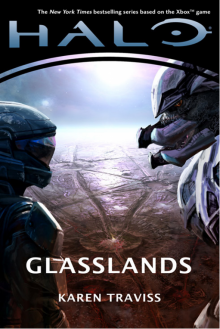 Halo: Glasslands
Halo: Glasslands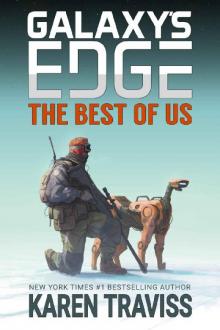 The Best of Us
The Best of Us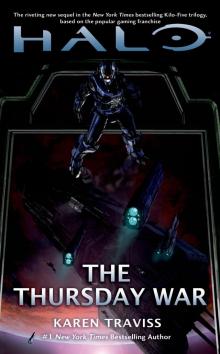 Halo: The Thursday War
Halo: The Thursday War Ally
Ally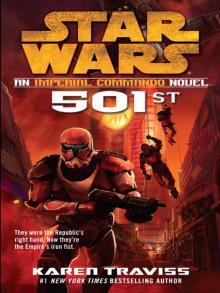 501st: An Imperial Commando Novel
501st: An Imperial Commando Novel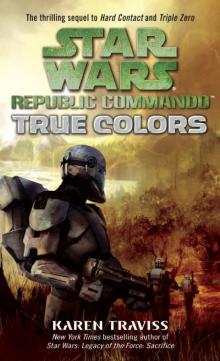 True Colors
True Colors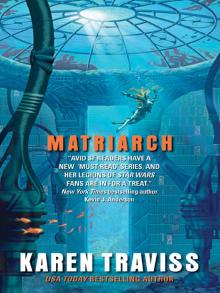 Matriarch
Matriarch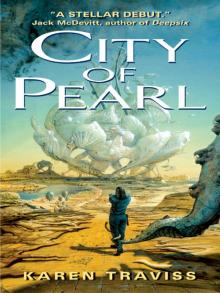 City of Pearl
City of Pearl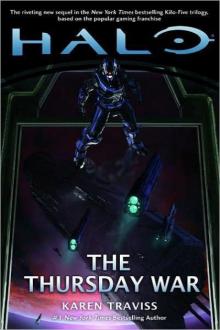 The Thursday War
The Thursday War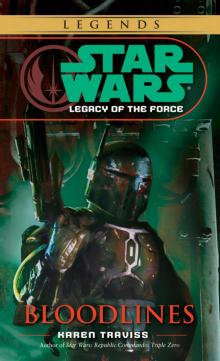 Bloodlines
Bloodlines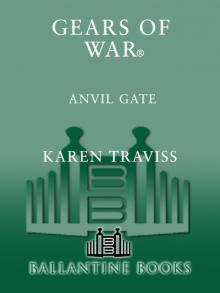 Gears of War: Anvil Gate
Gears of War: Anvil Gate Crossing the Line
Crossing the Line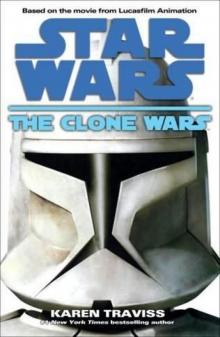 Star Wars - The Clone Wars 01
Star Wars - The Clone Wars 01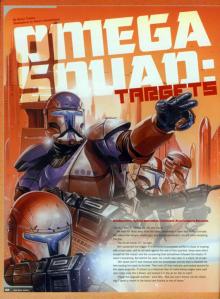 Omega Squad: Targets
Omega Squad: Targets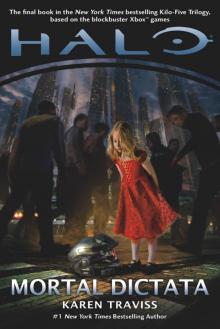 Halo®: Mortal Dictata
Halo®: Mortal Dictata Hard Contact
Hard Contact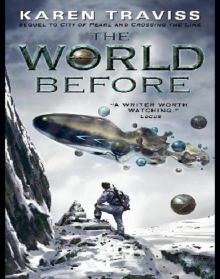 The World Before
The World Before Order 66
Order 66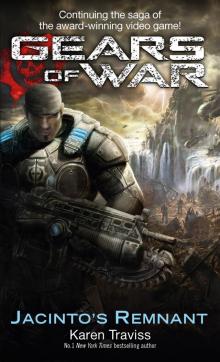 Gears of War: Jacinto's Remnant
Gears of War: Jacinto's Remnant Sacrifice
Sacrifice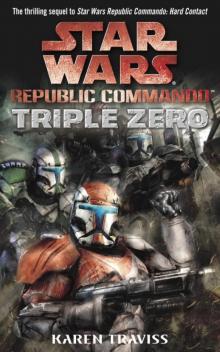 Triple Zero
Triple Zero Gears of War: The Slab (Gears of War 5)
Gears of War: The Slab (Gears of War 5)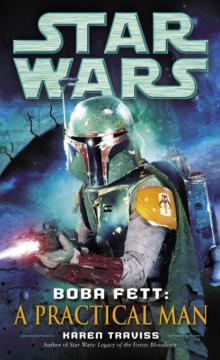 NEW JEDI ORDER: BOBA FETT: A PRACTICAL MAN
NEW JEDI ORDER: BOBA FETT: A PRACTICAL MAN Going Grey
Going Grey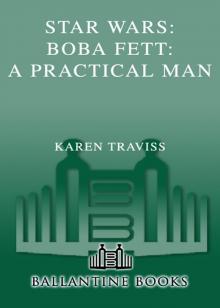 Star Wars: Boba Fett: A Practical Man
Star Wars: Boba Fett: A Practical Man Revelation
Revelation Coalition's End
Coalition's End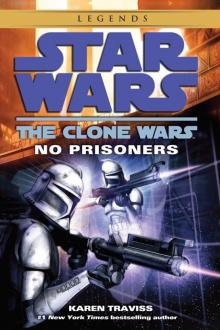 No Prisoners
No Prisoners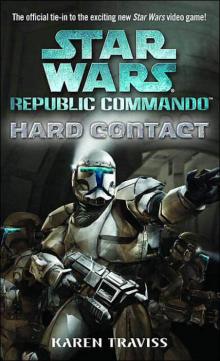 Star Wars Republic Commando: Hard Contact
Star Wars Republic Commando: Hard Contact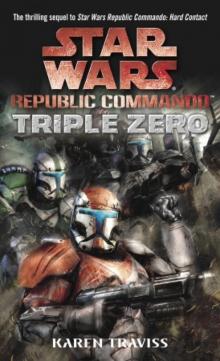 Star Wars: Republic Commando: Triple Zero rc-3
Star Wars: Republic Commando: Triple Zero rc-3 The Clone Wars
The Clone Wars The Clone Wars: No Prisoners
The Clone Wars: No Prisoners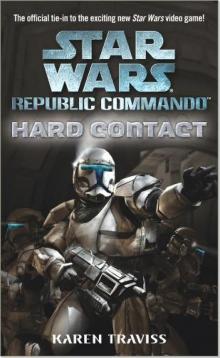 Star Wars: Republic Commando: Hard Contact rc-1
Star Wars: Republic Commando: Hard Contact rc-1 Judge
Judge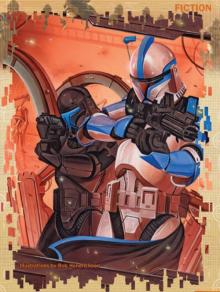 Omega Squad: Targets rc-4
Omega Squad: Targets rc-4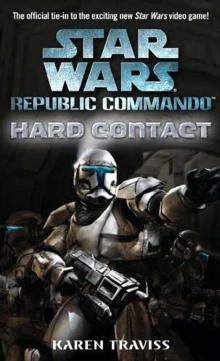 Star Wars - Republic Commando - Hard Contact
Star Wars - Republic Commando - Hard Contact